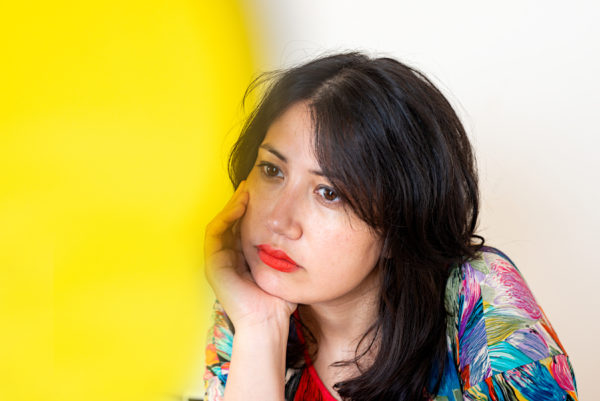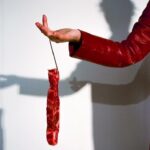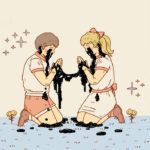Track by Track: Rosa Bordallo, ‘Reef Walker’
Posted: by The Alt Editing Staff

Photo by Varvara Mikushkina
Rosa Bordallo is a solo artist who has crafted her voice to speak for herself and many. Her experiences connecting to history, her own CHamoru heritage and home life in Guam, and the challenges of existing in a turbulent presidential climate have resulted in one of the best-crafted indie records of 2019.
Reef Walker is a simultaneous call-out and love letter that quietly arrived in October 2019. Rosa joins to share a track-by-track breakdown of the entire album that you’d be remiss to include in your Top Albums of 2019. While you’re reading, give the record a listen below:
To Mariana
Reef Walker opens with a song that I wrote about ten years ago and tried to record but I wasn’t happy
with the initial results. I had a number of ideas. Like one idea was to add a throbbing bass line and give it
the disco treatment. I even had an idea for a horns section. But eventually I decided to record it straight-
forwardly and make it the first song on the album because it introduces the listener to my story. I was also
curious what ideas Duane would have for it, and he brought in these instruments that lend a Baroque pop
feel, which I really love. I wrote this song when it really started to sink in that my path in life was
unalterable. I grew up in Guam in the Marianas, and I left as a teenager to go to college in New York and
then stayed.
I was able to visit home over the years but it was never for more than a couple weeks at a time. As a result I have never experienced what it’s like to be an adult there, to know my family and native community as an adult who contributes to life there. So there are all these feelings and memories that are stuck in time for me – like suspended animation, or fossils stuck in amber. They feel just as real and present today as they did back then, maybe even hyperreal, and they come with a distinct sense of loss.
Sleight of Hand
I really love how this song turned out. I wrote it in this tiny rehearsal space in Brooklyn that I was
subletting for Sunday afternoons. I’d go there by myself and rage on my guitar. At first I played it in this
minimalist grunge style influenced by PJ Harvey’s “Ecstasy”. Her album Rid of Me is one of my favorite
albums ever. I wanted to capture that brand of gut-wrenching romantic pathos, but the result was a bit
lackluster because it’s the same downbeat chord progression from beginning to end – I wanted something
dynamic, not an endless drone.
Many moons later, I brought my songs to Duane, and this was one of the first songs we tracked. Right away he shifted the song for the better. If I remember correctly, we were trying to figure out the right drumbeat for the chorus, and we settled on something really weird but in a good way because it opened up all these new possibilities. In the end it became something that is a more accurate reflection of my reality. The singer is making all these complaints about her man and trying to seduce him back but it’s with a knowing wink. It’s like game recognizes game. I’ve been the shitty non-committal person in a relationship just as often as I’ve been the one who’s desperate and obsessed. Long after I wrote the lyrics, I realized that ‘sleight of hand’ has a double meaning. It’s the guy being a ghost and a flake, but it’s also the singer’s ability to move on from him and put him out of her mind. If the relationship turns out to be an illusion, then that’s not the most awful thing, because you can more easily let it go.
Lost on the Coast
This song was written when I was going through a separation from someone very close to me. It dredged
up all these feelings of loss and abandonment that I accrued over my life. One of the hardest things I ever
went through was leaving everyone and everything I knew behind to move to New York where I had no
roots or connections. At first it was liberating and I was able to distract myself. But now that I’m older I
realize the toll it took on my psyche. I’ve always been a restless person. I will always need to seek
adventure in some way, shape, or form. But there’s a fine line between way-finding and just being lost. I
have a better sense of what grounds me now. Writing this song was part of the process of figuring that
out for myself.
Dust Bowl
This song was written 10 years ago and then sort of forgotten among my demos. When I listened to it
more recently, I remembered how much I enjoy singing it. The imagery is chilling. Most of the album had
been tracked and mixed when I decided to record it for Reef Walker.
This song, along with “To Mariana” and “Trust Territory,” was recorded at a converted church in upstate New York. When I first wrote it, I only had the chords and the vocal melody. I struggled to come up with lyrics. Then I played it for my friend Eoin McGrath, who is also a songwriter, and he suggested that it should be about The Dust Bowl, which was the worst environmental crisis of our country’s history at that time. I saw the Ken Burns documentary about it, and the turn of events is shocking. Poor agricultural practices, an unusually long drought, and wind erosion caused severe dust storms across the Great Plains. The dry loose soil would create these huge clouds that blackened the sky. They were called ‘black blizzards’ and they were deadly.
When I wrote the song, I imagined a girl and her younger brother playing in a dirt field somewhere and getting caught in a dust storm. She shields him from the dust and dies as a result. The lyrics are from her
perspective so its not until the last line that you realize she’s singing from beyond the grave. It’s a song
about sacrifice and martyrdom, but also the pain and dread of existence. There is a sense that the girl
was happy to die for a worthy cause. My favorite part is the bridge with the oohs as she sings about her
moment of dying. The pain (when I felt it hit) is followed by divine rapture (heard a joyous sound, angels).
I Am Pupa
At first I called this song “When I Was a Pupa” which was inspired by a poem that I wrote in a letter to
someone. The word pupa refers to a chrysalis or cocoon, so there’s an obvious reference to
transformation and metamorphosis. But when I first became enthralled with the word pupa, it was
because I learned that in Latin the word meant ‘girl; doll’ and the English word pupil (as in the pupil of an
eye) came from Old French pupille, which came from Latin pupilla, the diminutive of pupa. The pupilla
meant ‘little girl-doll’ in Latin, and it related to the eye because of the tiny image of oneself that you see
reflected in another person’s eye.
The origin of pupil meaning student also traces back to the Latin pupilla since it meant orphan child, or a ward of the state — so there’s an additional layer of meaning. How is a girl an orphan? How is an orphan girl reflected in another’s eye, either seen or invisible? And when you tie in pupa in the cocoon sense, how is the orphan girl’s metamorphosis either seen or unseen? I didn’t write the song with these ideas in the forefront of my mind, but unconsciously these sentiments were brewing and eventually surfaced. I knew when I was writing the song that I wanted to address the modern era’s legacy of human trafficking and exploitation.
For the past 500 years, countless people have been kidnapped, enslaved, conscripted into the military and maritime industries, or otherwise generally exploited and treated as subhuman. This trauma doesn’t go away in a generation or two. A lot of who I am – my personality, my value system – is an inheritance of trauma. So, I wanted to write a song that captured that state of being. It’s both fatalistic and hopeful. It’s a complete paradox.
You think life is short and brutal but then you also have a way to adapt to every situation you find yourself in. That resilience – its complicatedness and stubbornness – is what interested me. Right before the album got finished, I changed the title of the song to “I Am Pupa” because we are always in a state of potential and unfolding. Who we are today is the precedent to a future self.
M.O.S.S.
This song was first titled “Mirror of Simple Souls” after a written work by a 13th-century French Christian
mystic named Marguerite Porete. But then I thought ‘man, that’s really pretentious, even for me’ so I
turned it into an acronym. Which spells moss! I like moss. Moss is cool.
Seriously though, this is the most unabashed, pseudo-spiritual song I’ve ever written. I’m still not sure how I feel about it. I like writing lyrics that are a bit puzzling because then I can return to it years later and wonder if it still resonates, or if there’s a new meaning.
As for the arrangement, I’m really happy with where it ended up. The first thing I wrote was the bass riff. That lick was reverberating in my head for weeks and I didn’t know where to take it. Then I wrote something with minimal synths kind of in the vein of John Maus. I wanted it to be super minimalist Goth.
Then I met Donn Denniston, a guitarist, and we had jam sessions to help me formalize my new song ideas. He has a proto-punk sensibility — think Suicide and Velvet Underground — and so I started to approach the song like Lou Reed would. The lyrics became more interesting as a result. And that’s why there is a satellite’ reference. But eventually I decided to mess with it in Garage Band and tried to make it more unconventional. I didn’t want the music to feel too familiar or genre-specific. I want the listener to be a bit puzzled, cause then that makes you hone in on the lyrics. By the time I brought the demo to Duane, it had this kinetic, eclectic vibe, and he built it up from there.
The final version amazes me. I love all the musical phrases and twists and turns that he added. It’s saturated with this hippy futurist utopianism that is my natural headspace. The lyrics are about perseverance and doing the righteous thing when no one’s looking. The world is full of charlatans so I wanted to write something uplifting about all the good that happens in life, that is easy to miss because we’re programmed to focus on the negative.
Hoarders of New York
This song is pretty straight-forward. I used to be obsessed with reality shows about hoarders. I have
experience with the disorder through my family, so I’m actually pretty vigilant about not becoming one.
And in a city like New York with our tiny apartments, that’s a really hard thing to achieve. When I was in
college, I dated this older man who at the time was an indie filmmaker, but he also had an academic
background in ancient Greek philosophy, so he would tell me about the Stoics and the stuff he was
reading. He had almost no belongings but whatever he had he took good care of it, and he was really
clean and orderly. Like part ascetic, part Bohemian. He helped me sober up my mindset about my life and
a bit of that discipline rubbed off on me. Life really is unpredictable, so you have to make the most of each
moment. Hoarding, as a disorder, is really about the inability to see things as they are.
Citadel
This song, along with “Trust Territory,” is openly political, which is not typical for me as a songwriter. I’m
more of a navel gazer. But I started working on these songs in 2016, and as the election unfolded and it
became undeniable to even the most apolitical person that we had leaders who were hell-bent on
destruction, I just couldn’t not write a song that addressed this chaos. The people with the most power
and money are batshit crazy, cynical, greedy, ruthless and now operating unchecked — that’s my take on
it. That especially dawned on me when we reached the 10th anniversary of the 2008 financial crisis, and
almost nothing had changed. We might even be much worse off.
So part of this song was frustration with everything, and the other part was my frustration with New York in particular, which has become increasingly hostile to the poor, to the middle class — to everyone except the extremely wealthy, basically. This city draws in young and talented people from all over the world, and we all become complicit in this rigged system, whether we like it or not. But I try not to despair. Better to write an angry song and get on with life. Help out where you can. Keep it moving.
Trust Territory
This song is about Donald Trump, if that wasn’t obvious enough. I wrote it in 2016 and it’s a pleasant
surprise that my album release has coincided with the impeachment hearings. I named this song “Trust
Territory” because I want to point people toward the history of the United Nations trust territories, which
leads back to colonialism and imperialism.
The Trust Territories of the Pacific Islands were made of islands in Micronesia, the region where I’m from. The indigenous people of Pacific – at least, in my experience – have a very strong sense of justice. We’re willing to wait for the tides to turn in our favor. We can pretend to be docile and friendly, but as soon as we have access to political systems and leverage, we’re very good about practicing self-government. That’s the kind of attitude that I’d like to see in more stateside Americans. Sometimes you have to be patient, but when you have an opportunity to take power and seize it for the greater good, don’t hesitate.
See You in the Afterlife (No Longer Set Apart by Language)
This is an experimental piece that I made on my own. It was the last thing I recorded for the album. I
came up with the song title a long time ago – like years ago – but I never knew what I wanted to do with it.
The opening bars and the musical phrase that weaves through it – this was also written a long time ago.
Then more recently I started to reconnect with my CHamoru heritage, with a lot of intention. I was taught
a little bit of our native language, but I was never fluent, and I lost what little knowledge I had. So I wrote
this prayer-poem in English that addressed what I was going through, and I asked a CHamoru language
expert, Jeremy Cepeda, to translate it for me. This was a separate project and not related to my music
stuff. But then when I was putting this track together, I decided to include it.
Chant was and is very important to Pacific Islanders. I think intuitively I felt like this was an act of consecration. The other elements of this track are the sound of my breath as well as a recording of someone close to me. He’s talking about traumatic events he experienced during World War II. I know a lot of the stories but not all of them. I don’t mean to gain from other people’s tragedy, but this one is very personal to me, so I decided to put it out in the world, perhaps out of a sense of defiance. I don’t expect anyone to understand it, and I’m not seeking a reaction. This is just one way that I cope with things that can never be fully resolved or put at peace.
–
Follow Rosa Bordallo on social media:
Facebook | Instagram | Twitter
–
Amanda Starling | @starlingaj
The Alternative is ad-free and 100% supported by our readers. If you’d like to help us produce more content and promote more great new music, please consider donating to our Patreon page, which also allows you to receive sweet perks like free albums and The Alternative merch.










